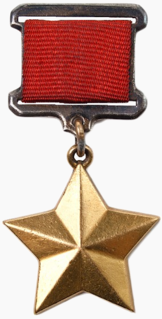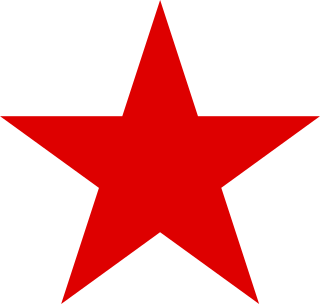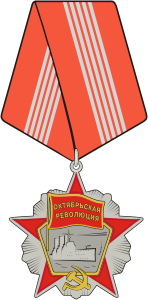
The Order of the Red Banner was the first Soviet military decoration. The Order was established on 16 September 1918, during the Russian Civil War by decree of the All-Russian Central Executive Committee. It was the highest award of Soviet Russia, subsequently the Soviet Union, until the Order of Lenin was established in 1930. Recipients were recognised for extraordinary heroism, dedication, and courage demonstrated on the battlefield. The Order was awarded to individuals as well as to military units, cities, ships, political and social organizations, and state enterprises. In later years, it was also awarded on the twentieth and again on the thirtieth anniversary of military, police, or state security service without requiring participation in combat.

The title Hero of the Soviet Union was the highest distinction in the Soviet Union, awarded together with the Order of Lenin personally or collectively for heroic feats in service to the Soviet state and society.

A red star, five-pointed and filled, is a symbol that has often historically been associated with communist ideology, particularly in combination with the hammer and sickle, but is also used as a purely socialist symbol in the 21st century. It has been widely used in flags, state emblems, monuments, ornaments, and logos.

Vladislav Aleksandrovich Tretiak, MSM is a Russian former goaltender for the Soviet Union national ice hockey team. Considered to be one of the greatest goaltenders in the history of the sport, he was voted one of six players to the International Ice Hockey Federation's (IIHF) Centennial All-Star Team in a poll conducted by a group of 56 experts from 16 countries. He is the current president of the Ice Hockey Federation of Russia and was the general manager of the Russian 2010 Winter Olympic team.

The Order of the October Revolution was instituted on October 31, 1967, in time for the 50th anniversary of the October Revolution. It was conferred upon individuals or groups for services furthering communism or the state, or in enhancing the defenses of the Soviet Union, military and civil. It is the second-highest Soviet order, after the Order of Lenin.

The Order of Victory was the highest military decoration awarded for World War II service in the Soviet Union, and one of the rarest orders in the world. The order was awarded only to Generals and Marshals for successfully conducting combat operations involving one or more army groups and resulting in a "successful operation within the framework of one or several fronts resulting in a radical change of the situation in favor of the Red Army." The Order of Victory is a standalone decoration awarded specially for service in World War II; unlike other awards such as the Hero of the Soviet Union, it does not belong to any order of ranking. In the history of the Soviet Union, the award had been awarded twenty times to twelve Soviet leaders and five foreign leaders, with one revocation. The last living recipient was King Michael I of Romania, who died on 5 December 2017.

The Order of the Red Star was a military decoration of the Soviet Union. It was established by decree of the Presidium of the Supreme Soviet of the USSR of 6 April 1930 but its statute was only defined in decree of the Presidium of the Supreme Soviet of the USSR of 5 May 1930. That statute was amended by decrees of the Presidium of the Supreme Soviet of the USSR of 7 May 1936, of 19 June 1943, of 26 February 1946, of 15 October 1947, of 16 December 1947 and by decree No 1803-X of 28 March 1980.

The Order of the Patriotic War is a Soviet military decoration that was awarded to all soldiers in the Soviet armed forces, security troops, and to partisans for heroic deeds during the German-Soviet War, known since the mid-1960s in the former Soviet Union as the Great Patriotic War.

The Order of Glory was a military decoration of the Soviet Union established by Decree of the Presidium of the Supreme Soviet on November 8, 1943. It was awarded to soldiers and non-commissioned officers of the Red Army as well as to aviation junior lieutenants, for bravery in the face of the enemy.

The Order of Alexander Nevsky is an order of merit of the Russian Federation named in honour of saint Alexander Nevsky (1220–1263) and bestowed to civil servants for twenty years or more of highly meritorious service. It was originally established by the Soviet Union as a military honour during World War II, more precisely by Decree of the Presidium of the Supreme Soviet of the USSR of July 7, 1942. Its statute was amended by Decree of the Presidium of the Supreme Soviet of the USSR of February 26, 1947. It bears a similar name to the Imperial Order of St. Alexander Nevsky which had been established by Empress Catherine I of Russia in 1725, and continued to be bestowed by the heads of the House of Romanov after the 1917 Russian Revolution. The Order of Alexander Nevsky was reinstated by the Soviet Union, minus the words "Imperial" and "Saint", for award to officers of the army for personal courage and resolute leadership. The Order was retained by the new Russian Federation following the dissolution of the USSR by Decision of the Supreme Soviet of the Russian Federation 2557-I of March 20, 1992 but was never awarded. The September 7, 2010 Decree №1099 of the President of the Russian Federation redesigned the badge of the Order closer to pre-1917 imperial model and amended the statute of the Order making it a purely civilian award.

Viktor Georgiyevich Kulikov was the Warsaw Pact commander-in-chief from 1977 to 1989. He was awarded the rank of the Marshal of the Soviet Union on 14 January 1977.

The Order of Nakhimov is a military decoration of the Russian Federation named in honour of Russian admiral Pavel Nakhimov (1802–1855) and bestowed to naval officers for outstanding military leadership. The order was established during World War II by decree of the Presidium of the Supreme Soviet of the USSR of March 3, 1944. Following the 1991 dissolution of the USSR, the Order of Nakhimov was retained unchanged by decision of the Supreme Soviet of the Russian Federation № 2424-1 of March 2, 1992 but it was not awarded in this form. The all encompassing Decree of the President of the Russian Federation № 1099 of September 7, 2010 that modernised and reorganised the entire Russian awards system away from its Soviet past amended the Order of Nakhimov to its present form, a ribbon mounted single class Order.
The 131st Separate Motor Rifle Brigade was a motorised infantry unit of the Soviet Army and of the Russian Ground Forces.

The Jubilee Medal "50 Years of the Soviet Militia" was a state commemorative medal of the Soviet Union established by decree of the Presidium of the Supreme Soviet of the USSR on November 20, 1967 to commemorate the fiftieth anniversary of the creation of the Soviet Militia, it was mainly awarded to deserving members of the state police. Its statute was amended on July 18, 1980 by decree of the Presidium of the Supreme Soviet.

Alexander Vasilyevich Belyakov was a Soviet flight navigator who, together with command pilot Valery Chkalov and co-pilot Georgy Baydukov, set a record for the longest uninterrupted flight in 1936 and made the first non-stop flight across the North Pole, flying from Moscow to Vancouver, Washington.

The Jubilee Medal "50 Years of the Armed Forces of the USSR" was a state military commemorative medal of the Soviet Union established on December 26, 1967 by decree of the Presidium of the Supreme Soviet of the USSR to denote the fiftieth anniversary of the creation of the Soviet Armed Forces. Its statute was amended on three occasions, by decrees of the Presidium of the Supreme Soviet of the USSR of February 22, 1968, of December 19, 1969, and of July 18, 1980.

The Medal "For Impeccable Service" was a Soviet military award for long service awarded to deserving members of the military personnel of the armed forces of the USSR, of the Interior Ministry of the USSR and of the Ministry for the Protection of Public Order of the USSR, to recognise ten, fifteen and twenty years of faithful and impeccable service to the state.

The Order of Lenin, named after the leader of the Russian October Revolution, was established by the Central Executive Committee on April 6, 1930. The order was the highest civilian decoration bestowed by the Soviet Union. The order was awarded to:
Awards and decorations of Mongolia are governed by the laws of Mongolia on awards.
















